Activist warns of Sri Lanka “massacres”
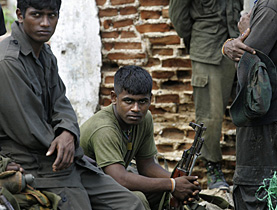
The defeat of the Tamil Tiger rebels at the hands of the Sri Lankan military could well lead to reprisal massacres, warns a Swiss human rights expert.
Sri Lankan troops are battling to finish one of Asia’s longest wars, having won a series of major battles and swiftly encircled the Liberation Tigers of Tamil Eelam (LTTE) in the northeast of the Indian Ocean island.
Sri Lanka’s president urged the rebels on Friday to allow the estimated 250,000 civilians trapped in the northern war zone to flee to safety following reports of heavy casualties among non-combatants stuck in the shrinking territory.
“The human right most under threat at the moment is life itself. After a conflict lasting over 30 years and atrocities committed on all sides, a military defeat of the Tigers would open the door to the settling of scores and massacres,” Adrien-Claude Zoller, director of the non-governmental organisation (NGO) Geneva for Human Rights, told swissinfo.
Zoller recently returned from the Sri Lankan capital, Colombo, where he had been giving human rights courses to civil society NGOs.
Human rights groups have accused the rebels of holding civilians hostage and accused the military of launching heavy attacks in areas filled with civilians, including a government-declared “safe zone” in the north.
Independent accounts of the fighting are not available because most journalists are barred from the war zone.
The United Nations High Commissioner for Human Rights Navi Pillay said on Thursday UN top officials were “seriously alarmed” over the fate of civilians in the north.
The LTTE, which has been fighting for a separate homeland for ethnic Tamils in northern Sri Lanka since 1983, were ousted from all major towns after heavy battles in recent months and are now cornered in a 300 square kilometre area of jungle and villages.
The military said it would not cease combat operations or declare a ceasefire, but would stop shooting to allow civilians to get out as it did for the convoy on Thursday.
“Major humanitarian situation”
“President Mahinda Rajapaksa and his government only believe in the strength of arms. They hope to wipe out the Tamil rebels. But this offensive, which dates back to the end of the ceasefire in January 2008, brings no political solution that involves any kind of conciliation. Currently nobody is talking about negotiations,” Zoller said.
“The Sri Lankan armed forces can defeat the LTTE’s armed forces but not its guerrilla groups, which can still commit bombings. Also, the rebels still control certain regions that are difficult to access.”
The Swiss-run International Committee of the Red Cross (ICRC), which helped evacuate 226 wounded civilians on Thursday, says “a major humanitarian situation” is unfolding in the Vanni region in the northeast.
The ICRC said hundreds have been killed or wounded in the past week. The government says those numbers are too high and may include wounded rebels. It says it has no exact figure.
The UN said it tried to get the people out on Tuesday, but the LTTE stopped them from going.
“Between 70,000 and 200,000 people cannot leave this zone controlled by the Tigers and bombed by the army. Those who tried to leave were killed by the rebels,” Zoller said.
“Army operations prevented humanitarian aid from being delivered to this region on several occasions. Over the past few years huge camps for displaced people have been set up, which today have been deprived of support.”
Much of the fighting has been “intrinsically incompatible with full respect of the basic rules of the law of war”, Jacques de Maio, ICRC head of operations for South Asia, told a news briefing in Geneva on Tuesday.
Civil society under pressure
Zoller says other regions are also plagued by violence, in particular the east of the island, which the LTTE lost and where paramilitary groups now roam. He also pointed the blame at Rajapaksa’s authoritarian leadership, backed by his brother Gotabhaya, who is the defence secretary.
“Civil society is under pressure throughout the country. Journalists are the first to be affected. Some have been killed and many have fled the island. Human rights activists risk being the next ones,” said the director.
According to Amnesty International, at least 14 journalists and Sri Lankans working for the media have been killed since the beginning of 2006. Another 20 have fled the country after getting death threats, it said.
After Colombia and Iraq, Sri Lanka is one of the countries with the largest number of people who have disappeared – 55,000 since the start of the conflict – Zoller added.
He called on Switzerland to strengthen its commitment to the Sri Lankan people.
“Switzerland has always been active in Colombo to support various human rights, social justice or development programmes. But it’s time for Bern to increase these activities,” he said.
“It’s not just about fostering peace negotiations between the criminals on both sides. It’s urgent that the population’s human rights are respected, especially its most exposed elements: the Tamil minority and Sri Lankan civil society.”
swissinfo, based on an article in French by Frédéric Burnand
The Tigers started fighting in the 1970s for a separate state for Tamils in Sri Lanka’s north and east. They argued that successive majority Sinhalese governments had discriminated against the Tamils.
The conflict has killed an estimated 70,000 people, displaced thousands more and held back the island’s growth and economic development.
The Tigers pulled out of talks in 2003 and again in 2006, claiming they were being sidelined, and between then and 2008 both sides accused each other of numerous breaches of the ceasefire as the country slid inexorably towards all out war.
Having announced the capture of Mullaitivu, the last of the Tamil Tigers’ northeastern strongholds, the Sri Lankan army says it is very close to defeating the rebels.
With a series of victories in recent months, the Sri Lankan military has boxed the insurgents into a small 300-square-kilometre area in the northeastern part of the island nation. The Red Cross estimates 250,000 civilians are trapped in the shrinking territory still under rebel control.
Both the military and the Tigers have been regularly accused of gross abuses of human rights by organisations such as Amnesty International and Human Rights Watch.
Sri Lankans are one of the biggest migrant groups in Switzerland.
There are 42,000 people of Sri Lankan origin in the country. Between 90 and 95 per cent of them are Tamils.
Since 1973 more than 11,000 Sri Lankans have acquired Swiss citizenship. One third of the Sri Lankans with permanent residence or Swiss citizenship were born in Switzerland.
The Tamils in Switzerland live mainly in the German-speaking areas, in particular cantons Bern, Zurich and Basel.
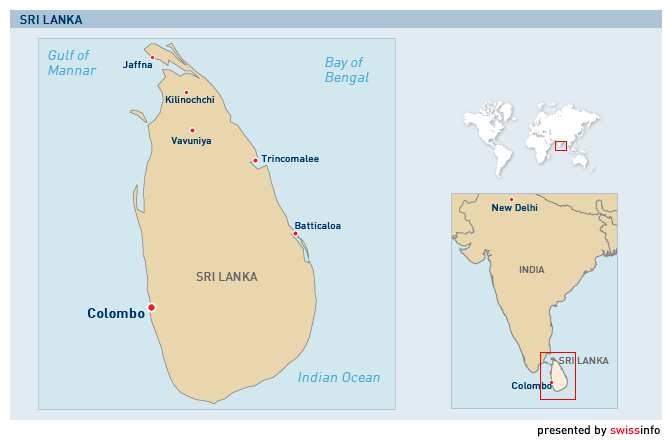

In compliance with the JTI standards
More: SWI swissinfo.ch certified by the Journalism Trust Initiative

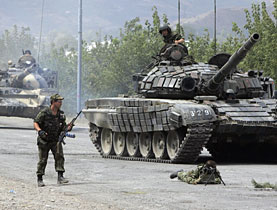
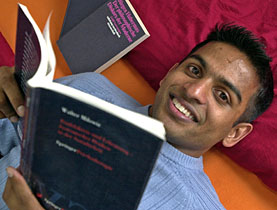
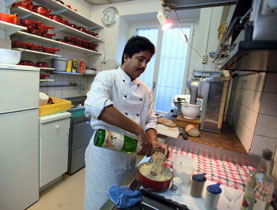
You can find an overview of ongoing debates with our journalists here. Please join us!
If you want to start a conversation about a topic raised in this article or want to report factual errors, email us at english@swissinfo.ch.